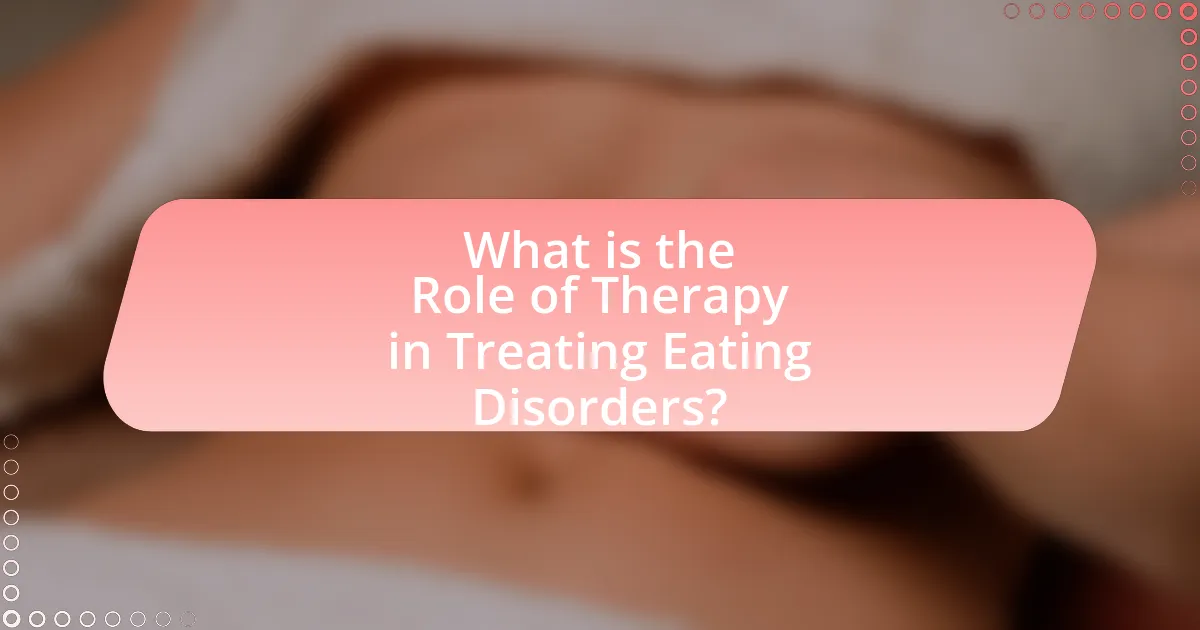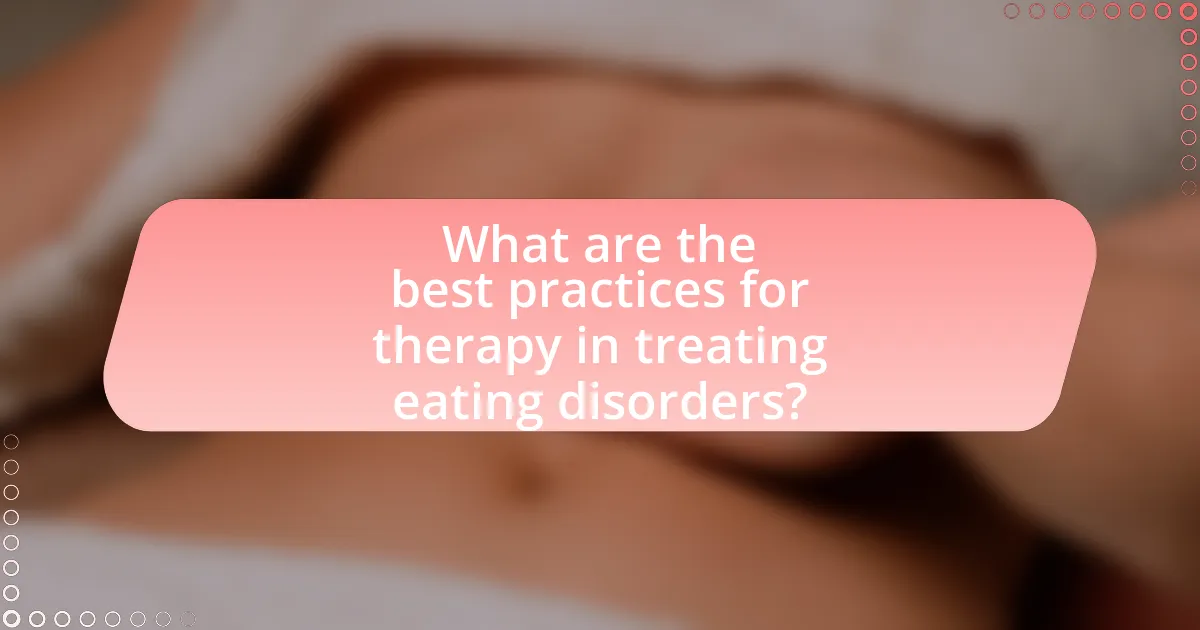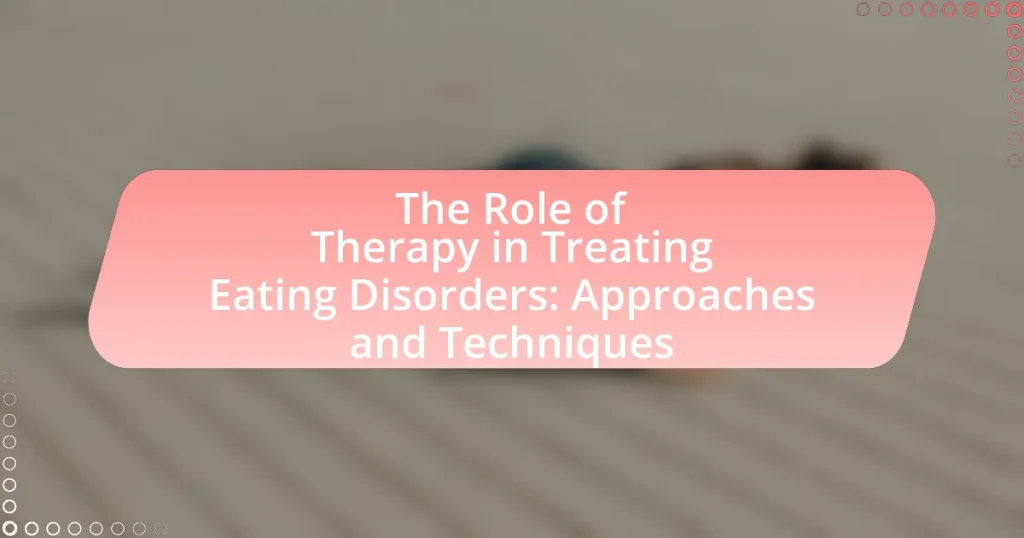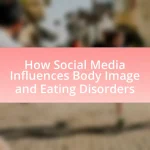The article focuses on the critical role of therapy in treating eating disorders, emphasizing various evidence-based approaches such as Cognitive Behavioral Therapy (CBT), Dialectical Behavior Therapy (DBT), and Family-Based Therapy (FBT). It outlines the significant impact of eating disorders on individuals’ physical and mental health, highlighting the psychological aspects that contribute to these conditions. The article also discusses the importance of nutritional counseling, mindfulness techniques, and the need for personalized treatment plans tailored to individual needs. Additionally, it addresses the challenges therapists face in treatment and the best practices for enhancing therapy effectiveness, providing a comprehensive overview of therapeutic interventions for eating disorders.

What is the Role of Therapy in Treating Eating Disorders?
Therapy plays a crucial role in treating eating disorders by addressing the psychological, emotional, and behavioral aspects of these conditions. Evidence-based therapeutic approaches, such as Cognitive Behavioral Therapy (CBT), have been shown to effectively reduce disordered eating behaviors and improve emotional regulation. For instance, a study published in the Journal of Consulting and Clinical Psychology found that CBT significantly reduced symptoms of bulimia nervosa and binge eating disorder in participants. Additionally, therapy provides a supportive environment for individuals to explore underlying issues, develop coping strategies, and foster a healthier relationship with food and body image.
How do eating disorders impact individuals’ lives?
Eating disorders significantly impact individuals’ lives by affecting their physical health, emotional well-being, and social relationships. Physically, these disorders can lead to severe health complications such as malnutrition, heart problems, and gastrointestinal issues, with studies indicating that approximately 20% of individuals with anorexia nervosa may die from complications related to the disorder. Emotionally, individuals often experience anxiety, depression, and low self-esteem, which can exacerbate the disorder and hinder recovery. Socially, eating disorders can lead to isolation as individuals may withdraw from family and friends due to shame or fear of judgment, disrupting their support systems. These multifaceted impacts highlight the critical need for effective therapeutic interventions to address both the psychological and physical aspects of eating disorders.
What are the common types of eating disorders?
The common types of eating disorders include anorexia nervosa, bulimia nervosa, binge-eating disorder, and avoidant/restrictive food intake disorder. Anorexia nervosa is characterized by extreme weight loss and an intense fear of gaining weight, while bulimia nervosa involves cycles of binge eating followed by purging. Binge-eating disorder is marked by recurrent episodes of eating large quantities of food without compensatory behaviors, and avoidant/restrictive food intake disorder involves a limited range of foods and avoidance of certain textures or colors. These classifications are recognized by the Diagnostic and Statistical Manual of Mental Disorders (DSM-5), which provides a framework for understanding and diagnosing these conditions.
How do eating disorders affect physical and mental health?
Eating disorders significantly impair both physical and mental health. Physically, they can lead to severe malnutrition, electrolyte imbalances, cardiovascular issues, and gastrointestinal problems, which can be life-threatening. For instance, anorexia nervosa can result in a heart rate decrease and osteoporosis due to nutrient deficiencies. Mentally, eating disorders are often associated with anxiety, depression, and low self-esteem, with studies indicating that individuals with these disorders have a higher prevalence of mood disorders. Research published in the Journal of Eating Disorders shows that approximately 50% of individuals with eating disorders also experience major depressive disorder, highlighting the intertwined nature of physical and mental health consequences.
Why is therapy essential in the treatment of eating disorders?
Therapy is essential in the treatment of eating disorders because it addresses the psychological, emotional, and behavioral aspects that contribute to these conditions. Eating disorders often stem from underlying issues such as trauma, anxiety, or low self-esteem, which therapy can help to identify and resolve. Research indicates that cognitive-behavioral therapy (CBT) is particularly effective, with studies showing that it leads to significant improvements in symptoms for approximately 50-70% of individuals with anorexia and bulimia. Additionally, therapy provides a supportive environment where individuals can develop healthier coping mechanisms and improve their relationship with food and body image.
What are the psychological aspects of eating disorders?
The psychological aspects of eating disorders include distorted body image, low self-esteem, and maladaptive coping mechanisms. Individuals with eating disorders often perceive themselves as overweight despite being underweight, leading to unhealthy behaviors aimed at weight control. Research indicates that approximately 70% of individuals with anorexia nervosa experience significant anxiety and depression, which can exacerbate their eating behaviors. Furthermore, cognitive distortions, such as all-or-nothing thinking, contribute to the maintenance of these disorders. These psychological factors highlight the need for therapeutic interventions that address both the emotional and cognitive components of eating disorders.
How does therapy address these psychological aspects?
Therapy addresses psychological aspects of eating disorders by utilizing evidence-based techniques to modify harmful thought patterns and behaviors. Cognitive Behavioral Therapy (CBT), for instance, helps individuals identify and challenge distorted beliefs about body image and food, leading to healthier coping mechanisms. Research indicates that CBT can significantly reduce symptoms of eating disorders, with studies showing a 50-70% improvement rate in patients after treatment. Additionally, therapies such as Dialectical Behavior Therapy (DBT) focus on emotional regulation and interpersonal effectiveness, which are crucial for individuals struggling with the emotional turmoil often associated with eating disorders. These therapeutic approaches provide structured support, fostering resilience and promoting long-term recovery.
What are the different therapeutic approaches used in treating eating disorders?
The different therapeutic approaches used in treating eating disorders include Cognitive Behavioral Therapy (CBT), Dialectical Behavior Therapy (DBT), Family-Based Therapy (FBT), and Interpersonal Therapy (IPT). CBT focuses on identifying and changing negative thought patterns and behaviors related to food and body image, which has been shown to be effective in reducing symptoms of disorders like anorexia and bulimia. DBT, originally developed for borderline personality disorder, helps individuals manage emotions and improve interpersonal relationships, making it beneficial for those with binge eating disorder. FBT involves the family in the treatment process, particularly for adolescents, and has demonstrated success in restoring healthy eating behaviors. IPT addresses interpersonal issues that may contribute to eating disorders, emphasizing the importance of social relationships in recovery. Each of these approaches is supported by clinical research indicating their efficacy in treating various eating disorders.
What is Cognitive Behavioral Therapy (CBT) and how does it work?
Cognitive Behavioral Therapy (CBT) is a structured, time-limited psychotherapy that focuses on identifying and changing negative thought patterns and behaviors. CBT operates on the principle that thoughts, feelings, and behaviors are interconnected, and by altering negative thoughts, individuals can change their emotional responses and behaviors. Research indicates that CBT is effective in treating various mental health issues, including eating disorders, by helping individuals develop healthier coping mechanisms and challenge distorted beliefs about food and body image. Studies, such as those published in the Journal of Consulting and Clinical Psychology, demonstrate that CBT significantly reduces symptoms of eating disorders and promotes long-term recovery.
How does Dialectical Behavior Therapy (DBT) contribute to treatment?
Dialectical Behavior Therapy (DBT) contributes to treatment by providing a structured approach that enhances emotional regulation and interpersonal effectiveness, which are crucial for individuals with eating disorders. DBT combines cognitive-behavioral techniques with mindfulness practices, allowing patients to develop skills to manage distress and improve their relationships. Research indicates that DBT significantly reduces symptoms of eating disorders, as evidenced by a study published in the Journal of Consulting and Clinical Psychology, which found that participants showed improved emotional regulation and reduced binge-eating episodes after DBT intervention. This structured skill-building approach directly addresses the underlying issues associated with eating disorders, making DBT an effective treatment modality.
What role does Family-Based Therapy (FBT) play in recovery?
Family-Based Therapy (FBT) plays a crucial role in the recovery from eating disorders by actively involving family members in the treatment process. This approach empowers families to support their loved ones in regaining control over their eating behaviors and addressing underlying psychological issues. Research indicates that FBT is particularly effective for adolescents with anorexia nervosa, with studies showing that approximately 75% of adolescents achieve full recovery after undergoing FBT. The therapy focuses on restoring healthy eating patterns and improving family dynamics, which are essential for long-term recovery.
How do therapists tailor treatment plans for individuals with eating disorders?
Therapists tailor treatment plans for individuals with eating disorders by conducting comprehensive assessments that consider the individual’s specific symptoms, medical history, and psychological factors. This personalized approach often includes integrating evidence-based therapies such as Cognitive Behavioral Therapy (CBT), which has been shown to effectively address distorted thinking patterns related to body image and food. Additionally, therapists may collaborate with dietitians to create nutritional plans that align with the individual’s recovery goals, ensuring a holistic treatment strategy. Research indicates that personalized treatment plans significantly improve outcomes, as they address the unique challenges faced by each individual, leading to more effective recovery processes.
What are the challenges therapists face in treating eating disorders?
Therapists face significant challenges in treating eating disorders, primarily due to the complex interplay of psychological, biological, and social factors involved. These challenges include the patients’ resistance to treatment, which can stem from denial or fear of weight gain, making engagement difficult. Additionally, the stigma surrounding eating disorders often leads to isolation, complicating the therapeutic relationship. Research indicates that approximately 30% of individuals with eating disorders do not seek treatment due to these barriers (National Eating Disorders Association). Furthermore, therapists must navigate co-occurring mental health issues, such as anxiety and depression, which can complicate the treatment process and require integrated approaches.

What techniques are commonly used in therapy for eating disorders?
Cognitive Behavioral Therapy (CBT) is a commonly used technique in therapy for eating disorders, focusing on changing negative thought patterns and behaviors related to food and body image. Research indicates that CBT is effective in reducing symptoms of anorexia, bulimia, and binge eating disorder, with studies showing a significant decrease in disordered eating behaviors and improved psychological well-being among participants. Additionally, Dialectical Behavior Therapy (DBT) is utilized to enhance emotional regulation and interpersonal effectiveness, particularly for individuals with binge eating disorder. Evidence supports that DBT can lead to reductions in binge eating episodes and improvements in emotional distress. Furthermore, Family-Based Therapy (FBT) is often employed for adolescents, involving family members in the treatment process to support recovery, with studies demonstrating its efficacy in promoting weight restoration and reducing eating disorder symptoms in young patients.
How does mindfulness play a role in therapy for eating disorders?
Mindfulness plays a crucial role in therapy for eating disorders by promoting awareness of thoughts, feelings, and bodily sensations related to eating behaviors. This approach helps individuals develop a non-judgmental attitude towards their experiences, which can reduce anxiety and improve emotional regulation. Research indicates that mindfulness-based interventions, such as Mindfulness-Based Eating Awareness Training (MB-EAT), have shown effectiveness in reducing binge eating and improving overall psychological well-being. A study published in the journal “Eating Disorders” by Kristeller and Johnson (2005) demonstrated that participants who engaged in mindfulness practices reported significant reductions in disordered eating behaviors and increased self-acceptance.
What mindfulness techniques are effective in treatment?
Mindfulness techniques effective in treatment include mindfulness-based stress reduction (MBSR), mindfulness-based cognitive therapy (MBCT), and mindful eating practices. MBSR, developed by Jon Kabat-Zinn, has been shown to reduce anxiety and improve emotional regulation, which is crucial for individuals with eating disorders. Research indicates that MBCT can prevent relapse in individuals with recurrent depression, a common comorbidity in eating disorders. Mindful eating practices encourage awareness of hunger and satiety cues, promoting healthier relationships with food. Studies demonstrate that these techniques can lead to significant improvements in psychological well-being and eating behaviors, making them valuable tools in therapeutic settings for treating eating disorders.
How does mindfulness impact emotional regulation?
Mindfulness significantly enhances emotional regulation by promoting awareness and acceptance of emotions without judgment. This practice allows individuals to observe their emotional responses and triggers, leading to better management of emotional states. Research indicates that mindfulness training can reduce emotional reactivity and increase emotional resilience, as evidenced by a study published in the journal “Emotion” by Keng, Smoski, and Robins, which found that participants who engaged in mindfulness practices reported improved emotional regulation skills and decreased symptoms of anxiety and depression.
What is the significance of nutritional counseling in therapy?
Nutritional counseling is significant in therapy as it addresses the dietary habits and nutritional needs of individuals, particularly those with eating disorders. This counseling helps clients understand the relationship between food, emotions, and health, promoting healthier eating patterns. Research indicates that integrating nutritional counseling into therapy can lead to improved treatment outcomes, as evidenced by a study published in the Journal of Eating Disorders, which found that patients receiving both nutritional and psychological support showed greater recovery rates compared to those receiving only psychological interventions. This highlights the essential role of nutritional counseling in fostering a holistic approach to therapy for eating disorders.
How does nutritional counseling complement psychological therapy?
Nutritional counseling complements psychological therapy by addressing the dietary habits and nutritional needs that can influence mental health and emotional well-being. This integration helps individuals with eating disorders by providing a structured approach to food intake, which can alleviate symptoms of anxiety and depression often associated with these disorders. Research indicates that individuals receiving both nutritional counseling and psychological therapy show improved outcomes, as evidenced by a study published in the Journal of Eating Disorders, which found that combined interventions led to greater reductions in disordered eating behaviors compared to psychological therapy alone. This synergy enhances the overall treatment effectiveness by fostering a holistic understanding of the relationship between nutrition and mental health.
What are the goals of nutritional counseling in eating disorder treatment?
The goals of nutritional counseling in eating disorder treatment include restoring healthy eating patterns, promoting nutritional knowledge, and addressing psychological factors related to food. Restoring healthy eating patterns aims to normalize dietary habits and ensure adequate nutrient intake, which is essential for physical recovery. Promoting nutritional knowledge helps individuals understand the importance of balanced diets and fosters a healthier relationship with food. Addressing psychological factors involves exploring emotional triggers and beliefs about food, which can aid in reducing disordered eating behaviors. These goals are supported by research indicating that effective nutritional counseling can significantly improve treatment outcomes for individuals with eating disorders.
How do therapists measure progress in treating eating disorders?
Therapists measure progress in treating eating disorders through a combination of clinical assessments, patient self-reports, and behavioral observations. Clinical assessments often include standardized questionnaires, such as the Eating Disorder Examination (EDE), which evaluates the severity of symptoms and changes over time. Patient self-reports provide insight into their thoughts, feelings, and behaviors related to food and body image, allowing therapists to track emotional and psychological improvements. Behavioral observations, including changes in eating patterns, weight stabilization, and engagement in therapy sessions, further indicate progress. Research shows that consistent monitoring using these methods can lead to more effective treatment outcomes, as evidenced by studies indicating that patients who regularly report their experiences tend to show greater improvement in their eating disorder symptoms.
What metrics are used to assess treatment effectiveness?
Metrics used to assess treatment effectiveness for eating disorders include clinical measures such as the Eating Disorder Examination (EDE), which evaluates the severity of eating disorder symptoms, and the Body Mass Index (BMI), which assesses weight status. Additionally, patient-reported outcomes like the Eating Disorder Inventory (EDI) and quality of life assessments provide insights into psychological and emotional well-being. Research indicates that these metrics are essential for tracking progress and determining the success of therapeutic interventions, as evidenced by studies showing correlations between symptom reduction and improved quality of life in patients undergoing treatment.
How do therapists adjust treatment plans based on progress?
Therapists adjust treatment plans based on progress by continuously evaluating the client’s response to therapy and modifying interventions accordingly. This process involves regular assessments, including feedback from the client, monitoring symptom changes, and reviewing therapeutic goals. For instance, if a client shows improvement in managing their eating behaviors, the therapist may introduce more advanced coping strategies or focus on underlying psychological issues. Conversely, if progress stalls, the therapist might revisit foundational techniques or explore alternative approaches. Research indicates that personalized adjustments in therapy enhance treatment efficacy, as evidenced by studies showing improved outcomes when therapists tailor interventions based on individual progress metrics.

What are the best practices for therapy in treating eating disorders?
The best practices for therapy in treating eating disorders include cognitive-behavioral therapy (CBT), family-based therapy (FBT), and interpersonal therapy (IPT). CBT is effective in addressing distorted thoughts and behaviors related to food and body image, with studies showing a significant reduction in symptoms for individuals with anorexia and bulimia. FBT, particularly for adolescents, involves the family in the treatment process, which has been shown to improve outcomes by fostering a supportive environment. IPT focuses on improving interpersonal relationships and has been validated as beneficial for those with binge eating disorder. These therapeutic approaches are supported by research indicating their efficacy in promoting recovery and improving psychological well-being in individuals with eating disorders.
How can individuals find the right therapist for eating disorder treatment?
Individuals can find the right therapist for eating disorder treatment by researching professionals who specialize in this area and verifying their credentials. It is essential to look for therapists with experience in treating eating disorders, as they often employ evidence-based approaches such as Cognitive Behavioral Therapy (CBT) or Dialectical Behavior Therapy (DBT), which have been shown to be effective. Additionally, individuals should consider therapists who are licensed and have relevant certifications, such as those from the Academy for Eating Disorders or the International Association of Eating Disorders Professionals. Seeking recommendations from healthcare providers or support groups can also guide individuals toward qualified therapists.
What tips can enhance the effectiveness of therapy for eating disorders?
To enhance the effectiveness of therapy for eating disorders, establishing a strong therapeutic alliance is crucial. A supportive and trusting relationship between the therapist and the patient fosters open communication, which is essential for addressing underlying issues related to the eating disorder. Research indicates that a positive therapeutic alliance significantly correlates with better treatment outcomes, as evidenced by a study published in the Journal of Consulting and Clinical Psychology, which found that patients who felt understood and supported by their therapists showed greater improvements in their eating behaviors and psychological well-being. Additionally, incorporating evidence-based practices, such as Cognitive Behavioral Therapy (CBT), can provide structured approaches to challenge and change harmful thought patterns associated with eating disorders, further enhancing therapy effectiveness.


